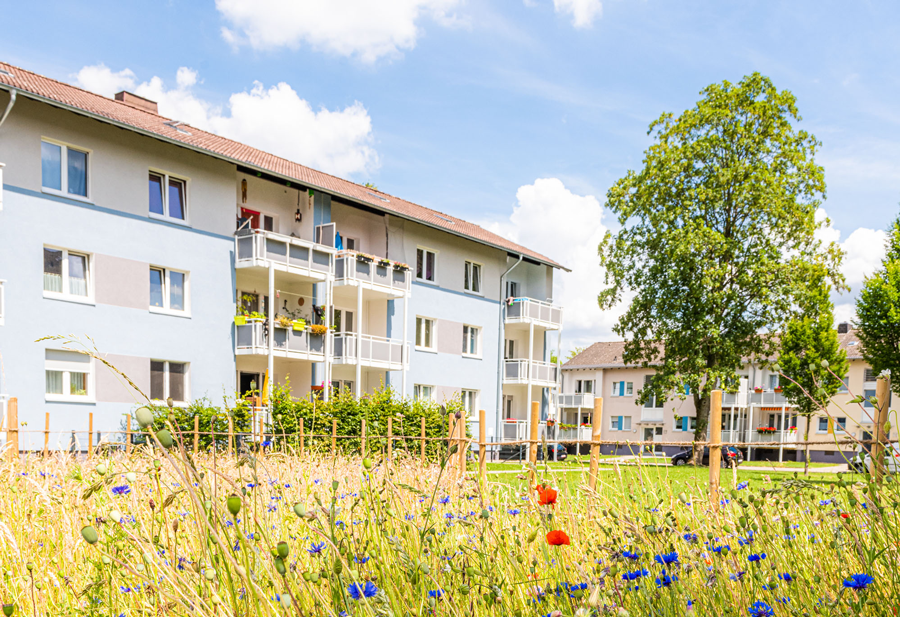Biodiversity
GRI
303-5
306-2
When designing our neighborhoods, we find a balance between what is ecologically valuable and what is economically sensible. We take care to choose appropriate measures, such as landscaping, planting trees, installing nesting boxes, creating urban meadows and making sure there are suitable habitats for insects. We use forward-looking plans to ensure that aspects such as maintenance and potential future changes in climatic conditions are taken into account. We have established standard procedures for preparing biodiversity reports for flora and fauna. The purpose of these reports is to ensure that all of the animal and plant species in an area are protected and maintained. We also use woodland surveys to determine the health and conservation value of the roughly 215,000 trees that comprise the woodland in the vicinity of our buildings and neighborhoods. We take a number of steps to maintain biodiversity when building new homes, such as the creation of green areas (see Sustainable Construction and Refurbishment).
Over the course of the reporting year, we gradually expanded our partnership with Naturschutzbund Deutschland e. V. (NABU), which began in 2019. Over 30 projects have been completed or are being developed nationwide on the basis of this partnership in locations including Berlin, Leipzig, Hamburg, Osnabrück and the Ruhr valley. Since this partnership began, in addition to converting over 100,000 m2 of general purpose lawns into wildflower meadows, we have created more than 250 insect habitats and installed over 500 nesting boxes for swifts and roosts for bats. The NABU experts also recommended site-specific seed mixtures for the 22 different geographic areas in Germany. We continued to work together in 2021 on projects aimed at the revitalization of habitats in rainwater retention basins and other worthwhile causes. We also organized a coronavirus-safe walk through the neighborhood in partnership with NABU so that the tenants of our pilot neighborhood in Bochum-Weitmar would have a chance to learn about our commitment to protecting biodiversity when we develop residential environments. We also held a walk for our stakeholders (incl. communication with the city, the Emschergenossenschaft water board, the planning office, NABU and Vonovia community development).
We are also working together with the NABU at our site in Bochum. An ecological nature trail is being created around Vonovia’s headquarters, which will inform employees and visitors about the eco-friendly measures we are implementing in our residential environments.
We actively involve our tenants in order to raise their awareness of ecological issues, e.g., by landscaping common areas to make them close to nature or setting aside spaces that can be used for urban gardening. We launched a partnership with the non-profit organization Acker e. V. (previously known as Ackerdemia e. V.) in 2020. We support the “Gemüseakademie” project, which uses vacant land on the grounds of nurseries and primary schools to grow fruit and vegetables. This gives children a chance to find out about plants and gardening. We will use other projects like “Bohnenabenteuer” and “Ackerhelden” to make the residents of our neighborhoods more aware of biodiversity. We include articles about projects of this kind in our customer magazine “zuhause” on a regular basis.
We take the suggestions of our tenants into consideration when we run projects to upgrade their residential environment. We integrated a wide range of suggestions from our tenants into the redesign of the neighborhood in Duisburg-Hüttenheim, for example. We are planning to include a wildflower meadow and an insect habitat, along with other green areas for tenants. Vonovia also commissioned a woodland survey so that we can protect as much of the local woodland as possible. We worked together with experts to decide which trees to keep and which should be replaced by planting new trees. To date, we have created around 170 tenant gardens nationwide. In the coming years, we anticipate a significant expansion of this scheme to more than 2,000 tenant gardens in Germany.


